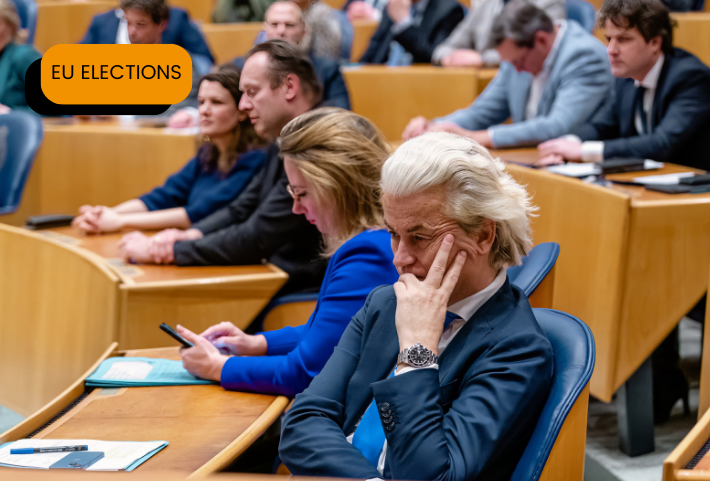By Angelo Boccato, Freelance Journalist
The next Dutch coalition government will be led by Dick Schoof, a former domestic intelligence chief, following months of negociations between the parties.
Schoof is the former Director-General of the General Intelligence and Security Service (Algemene Inlichtingen- en Veiligheidsdienst, AIVD) and Head of the National Coordinator for Security and Counterterrorism (Nationaal Coördinator Terrorismebestrijding en Veiligheid, NCTV), but the spy background of the new prime minister is not the most significant element of this government.

Four parties form this coalition government: the conservative-liberal VVD, the centrist New Social Contract, the Farmer Citizens Movement, and finally, the PVV led by Geert Wilders.
Wilders, one of the more prominent figures of the far-right, who is infamous for his Islamophobic tropes, is now the kingmaker of Dutch politics. What does this development mean for the future of the European far-right?
The long rise of Geert Wilders
“Wilders has had a certain foresight in terms of long-term political investment, especially when it comes to the war on Islam by the far-right. This foresight came at the right moment for him, as he picked up the political legacy of Pym Fortuyn whose killing (in 2002 by environmental and animal rights activist Volkert Van Der Graaf) is generally considered the beginning of the end for Dutch multiculturalism,” Massimiliano Sfregola, editor of the media 31Mag.NL tells MDI.
“Wilders found himself in the right place at the right time, between the electoral system where small parties with a single focus can get into parliament, the legacy of Fortuyn (who was a staunch critic of the Netherlands’ multiculturalism model) and the rhetoric against Islam.”
As Sfregola adds, Wilders was expelled from former Dutch PM Mark Rutte’s party in 2004 for his hostility against the VVD’s party line in favour of supporting Turkey’s entry into the European Union.
“Finally, there is the fact that he was the first Dutch politician to be put under armed escort.”
Wilders has been living in safe houses since 2004, when policemen arrived at his house to escort him away to safety as a result of threats from Islamists extremists. That happened on the same day that Dutch-Moroccan Mohammed Buyeri killed Dutch director Theo Van Gogh. Nobody knows or can know where Wilders lives.
As Sfregola observes, his life under police protection is an argument used by Wilders to prove his point about the dangers of Islam, radicalising his voters and base of supporters.
Wilders is the leading figure in the far-right. He was prominent for years before Giorgia Meloni was even a minister in the third Berlusconi government and when Marine Le Pen was still in her father’s shadow.
For this reason, his long time away from the levers of power in the Netherlands may seem bizarre, but like all far-right leaders, not being in power does not mean being unable to influence or even lead the conversation.
Two other crucial elements of the Wilders model are the post-party nature, he is the only person in the PVV and his contempt for the media.
PVV, a personal party, and Wilders’ contempt for the media
“Wilders has contempt for the media and does not interact with them, he does not give interviews,” Sfregola says.
While it is impossible to interview him, Sfregola explains that he did speak to people close to him, who highlighted the fact that his now 20-years in isolation have had a significative impact and his radicalisation has grown.
Since 2016, with Brexit and Trump’s victory, there has been an overall move towards the far-right, also pushing the Right further away from the centre.
Sfregola says that while Italy has been a political laboratory for personalistic parties, with Forza Italia as the most recent case study, the Netherlands with Wilders have further evolved this model.
The PVV seem to have no party branches, no local or territorial organisation, no staff, no members and its main house organ is Wilders’ X profile, counting 1.4 million followers, therefore not needing intermediate communication through its electorate via the media.
The origins of the funds that support Wilders political activity are unclear and an element of legitimate concern.
Wilders has been able to move from topic to topic, and minority to minority, becoming supportive of LGBTQIA rights when convenient and not being hostile to the Dutch-Surinamese communities, to the point that Sfregola says the only people he despises and attacks are asylum seekers, especially from Muslim countries, as well as environmentalists.
Wilders has also understood, unlike others such as Matteo Salvini, the need to provide support to Ukraine, despite an earlier resistance to supplying weapons, and was one of the first figures in the European far-right to establish links with the Israeli Right and far-right.
While Wilders will not occupy a ministry in this new government and it is presented as a centre-right one, observers do not have many doubts about the effective nature of the government, especially in terms of curbing migration and limiting climate intervention, the two boogeymen in the international far-right’s culture wars.
The Netherlands represents a case study of a country where a far-right leader can rise to power even without any need for normalisation or media support: in a way, a cautionary tale even stronger than the one of the AfD.

Pictures from shutterstock.com
Disclaimer:
The views and opinions expressed in this article are solely those of the author and do not reflect the official policy or position of the Media Diversity Institute. Any question or comment should be addressed to [email protected]
